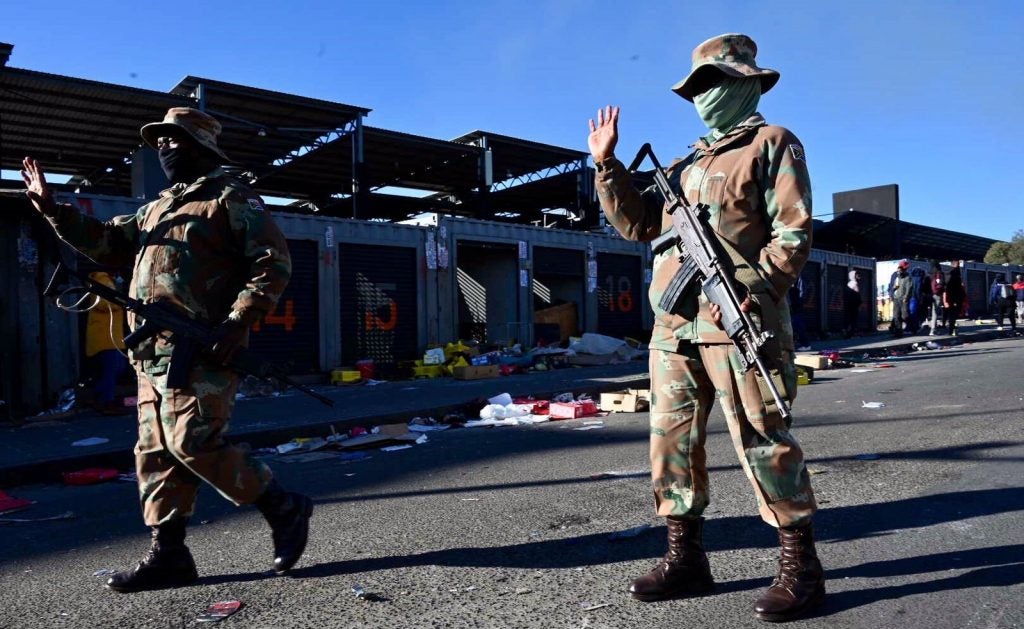South African Military Deployed In Response To Riots, Looting
South African National Defense Forces troops were deployed to KwaZulu-Natal and Gauteng provinces late Monday night, bolstering South African Police Services officers struggling to contain a wave of violent riots and looting that have swept the provinces since the jailing of former South African president Jacob Zuma last Friday.
President Cyril Ramaphosa announced that he had authorized the deployment of SANDF troops in a televised address on Monday, saying that while the rioting and looting may “have its roots in the pronouncements and activities of individuals with a political purpose, and in expressions of frustration and anger”, the current “chaos” was being instigated by groups of people as cover for their looting. He vowed that the police and SANDF would restore order, despite news footage over the weekend of overwhelmed police officers unable to handle the unrest.
SANDF spokesperson Brigadier-General Mafi Mgobhozi said to SABC News that there are currently 2,500 soldiers deployed to KwaZulu-Natal and Gauteng, with the SANDF “doing all in its power” to have additional soldiers deployed. He stressed that SANDF troops were there to support the police, deploying to “hotspots” identified by police intelligence in order to prevent violence and looting before it happened.
However, riots and looting continued into Tuesday, even as reports of deaths in stampedes during looting brought the death toll to at least 45 people, including a Ekurhuleni metro police officer who was shot dead. Police Minister Bheki Cele said during a Tuesday briefing by the government’s Justice, Crime Prevention, and Security cluster that 757 people have been arrested for their involvement in the riots, with 304 arrests in KwaZulu-Natal and 453 in Gauteng, as well as an additional 30 in Gauteng during his statement.
In response to whether police were investigating Zuma’s daughter Duduzile Zuma-Sambudla for apparent calls to violence on social media after Jacob was jailed for contempt of court, Cele said that investigations were focusing on 10 to 12 individuals believed to have encouraged or planned the unrest. State Security Minister Ayanda Dlodlo added that some of the individuals suspected of organizing the chaos are believed to be former members of South Africa’s State Security Agency intelligence service, who were aligned with Zuma during his alleged abuses of the agency’s power during his presidency.
In response to criticism of SANDF abuses during South Africa’s COVID-19 lockdown last year, infamously the death of Collins Khosa following a beating by SANDF soldiers inside his own home, SANDF Chief of Joint Operations Major General Siphiwe Sangweni said during the briefing that SANDF troops had been trained to respect codes of conduct while dealing with civilians. While he stated that he could not guarantee that no abuses would happen, he added that any troops found to be acting “outside the scope of the law” would be investigated as well.
While the protests that sparked the riots are attributed to Zuma loyalists protesting the former president’s 15 month jail sentence, observers and analysts have stated that the current looting is also tied to extreme desperation by South Africa’s poor, who have seen the COVID-19 pandemic disproportionately affect them. South Africa’s National Income Dynamics Study (NIDS) Coronavirus Rapid Mobile Survey (CRAM) project has reported that school dropout rates have tripled due to the pandemic, with 750,000 children now out of school, compared to 200,000 before the pandemic. The project’s latest report also warns that household and child hunger rates have remained “stubbornly high” since June 2020, despite subsequent relaxations and tightening of lockdown restrictions in response to the second and third waves of the pandemic.

